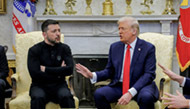Free Speech In the U.S. Is a Crime Elsewhere
VANCOUVER, British Columbia - In the United States, the debate over what constitutes free speech or hate speech has been settled. Under the First Amendment of the Constitution, newspapers and magazines can say what they like about minorities and religions - even false, provocative or hateful things - without legal consequence.
This is not the case in much of the world. Canada, England, France, Germany, the Netherlands, South Africa, Australia and India all have laws or have signed international conventions banning hate speech. Israel and France forbid the sale of Nazi items like swastikas and flags. It is a crime to deny the Holocaust in Canada, Germany and France.
In 2006, a Canadian magazine published an article arguing that the rise of Islam threatened Western values. The article’s tone was mocking and biting, but it said nothing that conservative magazines and blogs in the United States do not say every day without fear of legal reprisal.
Things are different in Canada. The magazine went on trial.
Two members of the Canadian Islamic Congress say the magazine, Maclean’s, Canada’s leading newsweekly, violated a provincial hate speech law by stirring up hatred against Muslims. They say the magazine should be forbidden from saying similar things, forced to publish a rebuttal and made to compensate Muslims for injuring their “dignity, feelings and self-respect.”
The British Columbia Human Rights Tribunal, which held five days of hearings on those questions here in early June, will soon rule on whether Maclean’s violated the law. On June 28, the Canadian Human Rights Commission dismissed a separate complaint against the magazine filed by the Canadian Islamic Congress.
The Maclean’s article, “Why the Future Belongs to Islam,” was an excerpt from a book by Mark Steyn called “America Alone.” The title was fitting: The United States, in its treatment of hate speech, as in so many other areas of the law, takes a distinctive legal path.
“In much of the developed world, one uses racial epithets at one’s legal peril, one displays Nazi regalia and the other trappings of ethnic hatred at significant legal risk, and one urges discrimination against religious minorities under threat of fine or imprisonment,” Frederick Schauer, a professor at the John F. Kennedy School of Government at Harvard University, wrote in a recent essay called “The Exceptional First Amendment.”
“But in the United States,” Professor Schauer continued, “all such speech remains constitutionally protected.” Some prominent legal scholars say the United States should reconsider its position on hate speech.
“It is not clear to me that the Europeans are mistaken,” Jeremy Waldron, a legal philosopher, wrote in The New York Review of Books in May, “when they say that a liberal democracy must take affirmative responsibility for protecting the atmosphere of mutual respect against certain forms of vicious attack.”
Professor Waldron was reviewing “Freedom for the Thought That We Hate: A Biography of the First Amendment” by Anthony Lewis, the former New York Times columnist. Mr. Lewis has been critical of efforts to use the law to limit hate speech.
But even Mr. Lewis, a liberal, wrote in his book that he was inclined to relax some of the most stringent First Amendment protections “in an age when words have inspired acts of mass murder and terrorism.”
In particular, he called for a re-examination of the Supreme Court’s insistence that there is only one justification for making incitement a criminal offense: the likelihood of imminent violence.
The imminence requirement sets a high hurdle. Mere advocacy of violence, terrorism or the overthrow of the government is not enough; the words must be meant to and be likely to produce violence or lawlessness right away.
Mr. Lewis wrote that there was “genuinely dangerous” speech that did not meet the imminence requirement, but that it should be punished.
Harvey A. Silverglate, a civil liberties lawyer in Cambridge, Massachusetts, disagreed. “When times are tough,” he said, “there seems to be a tendency to say there is too much freedom.
“Free speech matters because it works,” Mr. Silverglate continued.
Scrutiny and debate are more effective ways of combating hate speech than censorship, he said, and all the more so in the post- September 11 era.
“The world didn’t suffer because too many people read ‘Mein Kampf,’ ” Mr. Silverglate said. “Sending Hitler on a speaking tour of the United States would have been quite a good idea.”
The First Amendment is not, of course, absolute. The Supreme Court has said that the government may ban fighting words or threats. Punishments may be enhanced for violent crimes prompted by racial hatred.
“What we’re learning here is really the bedrock difference between the United States and the countries that are in a broad sense its legal cousins,” Mr. Steyn added. “Western governments are becoming increasingly comfortable with the regulation of opinion. The First Amendment really does distinguish the U.S., not just from Canada but from the rest of the Western world.”
스마터리빙
more [ 건강]
[ 건강]이제 혈관 건강도 챙기자!
[현대해운]우리 눈에 보이지 않기 때문에 혈관 건강을 챙기는 것은 결코 쉽지 않은데요. 여러분은 혈관 건강을 유지하기 위해 어떤 노력을 하시나요?
 [ 건강]
[ 건강]내 몸이 건강해지는 과일궁합
 [ 라이프]
[ 라이프]벌레야 물럿거라! 천연 해충제 만들기
 [ 건강]
[ 건강]혈압 낮추는데 좋은 식품
[현대해운]혈관 건강은 주로 노화가 진행되면서 지켜야 할 문제라고 인식되어 왔습니다. 최근 생활 패턴과 식생활의 변화로 혈관의 노화 진행이 빨라지고
사람·사람들
more많이 본 기사
- 법무부 “엡스타인 자료 100만건 추가돼…공개에 수주 소요”
- 테슬라 ‘비상시 차문 안열리는’ 문제로 당국 추가 조사
- 성탄 전날 LA 일대 폭풍우…돌발 홍수·산사태 경보
- 美당국자 “백악관, 우선은 제재통한 베네수 경제압박에 초점”
- 김정은, 8천700t급 핵잠 건조 지도… “韓핵잠, 반드시 대응할 위협”
- “청소년 성별확정치료 중단 안돼”…19개주, 정부 상대 소송
- [‘로드 레이지’ 한인 피살 현장 상세 상황] 끼어들기 시비가 비극으로… 차에서 내려 “쏴봐라” 언쟁
- 경찰, ‘통일교 로비 키맨’ UPF 前회장 13시간 피의자 조사
- 美, 물류거점창고에 불체자 8만명 수용 추진… ‘아마존택배’ 방식
- 브라운대 총격범, 대학원 중퇴후 고립된 삶… “유령같은 존재”
- 기부 줄이는 미국인들…트럼프·고물가·탈종교 3중 한파
- [성탄절 문 여는 곳은] 코스코·월마트 닫고… CVS는 영업
- 팀 쿡 애플 CEO, 나이키 주식 43억원어치 매입…나이키 주가↑
- 뉴욕시 전철 2인1조 운행 물건너 가
- 대통령 상징 ‘봉황기’ 29일 0시 용산서 내리고 청와대에 걸린다
- 박나래, 과거 또 파묘..이번엔 ‘나혼산’ 18L 식용유 장면
- [이민 단속] 여권 소지 시민권자들 … 2
- 함소원, 진화와 한 지붕 이혼 부부..결국 눈물 “헤어지는 게 힘들어”
- 조지호 “尹 월담 의원 체포지시” 재증언…尹측 “사실과 달라”
- ‘박지윤과 이혼’ 최동석, 두 자녀와 데이트.. “기적 같은 일”
- ‘월드컵 우승 가능성’ 한국 34위·일본 16위, 韓 A조에서도 ‘세 번째’
- 제니, ‘MMA’서 불태웠다..천만 조회수 앞두고 “평생 간직할 것”
- 트럼프, ‘나비넥타이’ 매고 연말 대중문화 시상식 일부 진행
- ‘이정후 위엄’ SF CEO+사장+단장+감독→韓 총출동! 황재균·윌리 아다메스까지 선행 참여
- “최고의 산타” 아이유, ‘21세기 대군부인’ 현장에 통 큰 선물 쐈다
- 역주행 승용차 덮쳐 한인 등 2명 사망
- [이민 단속] 새해에도 더 공격적 단속
- 트럼프의 새 독트린 “미국을 다시 왜소하게”
- 온라인쇼핑과 반품, 그리고 그 이후 1
- 안보리서 ‘베네수엘라’ 긴급회의…美 “합법” vs 중러 “주권침해”
- 이대우 뉴저지한인회장, “적자 개인적으로 전액변제”
- 크리스마스 대형 폭풍… 침수·산사태 대비 ‘비상’
- 트럼프 행정부, H-1B비자 추첨 내년 2월 폐지…고임금 인력 우대
- 가난해서 흙 팠는데… ‘다이아’ 캤다
- 군 장교에서 글로벌 교육 리더로‘제2의 인생’ 을 살다
- [송년 행사] KAMA USA 실버모델협회
- 뉴욕시 최저임금 인상⋯ 1월1일부터 17달러
- ‘파워볼’ 열풍 계속… 오늘 잭팟상금 17억 달러
- [미국은 지금] MAGA의 분열, 예… 1
- 먹는 비만약 경쟁 치열 ‘위고비’ 미국 판매승인
- [부 고] 박종군 전 뉴욕청과협회장 별세
- 차기 대선 선호도… 공화 ‘밴스’ ·민주 ‘뉴섬’ 선두
- 우크라, 20개항 종전안 최신판 공개…영토 할양은 ‘미해결’
- 뉴저지한국학교 종강식^ 학습발표회
- 맘다니, 샌더스 의원 앞에서 취임선서
- 엡스타인 자료 추가 공개… “전용기에 트럼프 8번 타”
- [수요 에세이] 삶이라는 배를 타고
- “다카이치 내년 3월 후반 미국서 트럼프와 회담 타진”
- [‘로드 레이지’ 한인 피살 현장 상세 상황] 끼어들기 시비가 비극으로… 차에서 내려 “쏴봐라” 언쟁
- 해병대전우회 동부연합회·뉴욕해병대전우회 송년회
1/5지식톡

-
 미 육군 사관학교 West Poin…
0
미 육군 사관학교 West Poin…
0https://youtu.be/SxD8cEhNV6Q연락처:wpkapca@gmail.comJohn Choi: 714-716-6414West Point 합격증을 받으셨나요?미 육군사관학교 West Point 학부모 모…
-
 ☝️해외에서도 가능한 한국어 선생님…
0
☝️해외에서도 가능한 한국어 선생님…
0이 영상 하나면 충분합니다!♥️상담신청문의♥️☝️ 문의 폭주로 '선착순 상담'만 진행합니다.☎️ : 02-6213-9094✨카카오톡ID : @GOODEDU77 (@골뱅이 꼭 붙여주셔야합니다…
-
 테슬라 자동차 시트커버 장착
0
테슬라 자동차 시트커버 장착
0테슬라 시트커버, 사놓고 아직 못 씌우셨죠?장착이 생각보다 쉽지 않습니다.20년 경력 전문가에게 맡기세요 — 깔끔하고 딱 맞게 장착해드립니다!장착비용:앞좌석: $40뒷좌석: $60앞·뒷좌석 …
-
 식당용 부탄가스
0
식당용 부탄가스
0식당용 부탄가스 홀세일 합니다 로스앤젤레스 다운타운 픽업 가능 안녕 하세요?강아지 & 고양이 모든 애완동물 / 반려동물 식품 & 모든 애완동물/반려동물 관련 제품들 전문적으로 홀세일/취급하는 회사 입니다 100% …
-
 ACSL 국제 컴퓨터 과학 대회, …
0
ACSL 국제 컴퓨터 과학 대회, …
0웹사이트 : www.eduspot.co.kr 카카오톡 상담하기 : https://pf.kakao.com/_BEQWxb블로그 : https://blog.naver.com/eduspotmain안녕하세요, 에듀스팟입니다…
케이타운 1번가
오피니언
 정숙희 논설위원
정숙희 논설위원온라인쇼핑과 반품, 그리고 그 이후
 파리드 자카리아 / 워싱턴포스트 칼럼니스트 / CNN ‘GPS’ 호스트
파리드 자카리아 / 워싱턴포스트 칼럼니스트 / CNN ‘GPS’ 호스트 트럼프의 새 독트린 “미국을 다시 왜소하게”
 김동찬 시민참여센터 대표
김동찬 시민참여센터 대표 [미국은 지금] MAGA의 분열, 예견된 균열의 시작
 임지영 (주)즐거운 예감 한점 갤러리 대표
임지영 (주)즐거운 예감 한점 갤러리 대표 [수요 에세이] 삶이라는 배를 타고
 이영창 / 한국일보 기자
이영창 / 한국일보 기자[지평선] ‘인간GPT’ 환각의 부작용
 조환동 / 편집기획국장·경제부장
조환동 / 편집기획국장·경제부장 AI로 가속화되는 노동시장 개편
 민경훈 논설위원
민경훈 논설위원‘크리스마스 캐롤’과 산타 클로스
 정재민 KAIST 문술미래전략 대학원 교수
정재민 KAIST 문술미래전략 대학원 교수 [정재민의 미디어풍경] 적과의 동침, 협력하며 경쟁하기
 김영화 수필가
김영화 수필가 [화요칼럼] 단호박의 온기
1/3지사별 뉴스

“온 세상에 평화를⋯”
숨가쁘게 달려온 2025년을 이제 1주일 남짓 남긴 채 크리스마스 이브를 맞는다. 다사다난했던 한 해를 되돌아보며 마무리하는 연말 시즌과 크리…
H-1B비자 고임금·경력자에 우선권

‘올해는 ICE 이민자 체포 광풍의 해’
올 한해동안 버지니아와 메릴랜드, DC 등에서 연방 이민당국에 체포된 사람이 1만명이 훌쩍 넘는 것으로 조사됐다. 또 미 전국적으로는 22만명…
“ATM기 사용하기 겁나네”

연말 ‘로드레이지’ 비극… 한인 총격 피살
연말을 맞아 도로 위에서 순간적으로 벌어진 운전 중 시비가 40대 한인 가장의 총격 피살 비극으로 이어졌다. 워싱턴주 레이시 경찰국과 서스턴 …
[‘로드 레이지’ 한인 피살 현장 상세 상황] 끼어들기 시비가 비극으로… 차에서 내려 “쏴봐라” 언쟁

오늘 하루 이 창 열지 않음 닫기 





















































.png)


댓글 안에 당신의 성숙함도 담아 주세요.
'오늘의 한마디'는 기사에 대하여 자신의 생각을 말하고 남의 생각을 들으며 서로 다양한 의견을 나누는 공간입니다. 그러나 간혹 불건전한 내용을 올리시는 분들이 계셔서 건전한 인터넷문화 정착을 위해 아래와 같은 운영원칙을 적용합니다.
자체 모니터링을 통해 아래에 해당하는 내용이 포함된 댓글이 발견되면 예고없이 삭제 조치를 하겠습니다.
불건전한 댓글을 올리거나, 이름에 비속어 및 상대방의 불쾌감을 주는 단어를 사용, 유명인 또는 특정 일반인을 사칭하는 경우 이용에 대한 차단 제재를 받을 수 있습니다. 차단될 경우, 일주일간 댓글을 달수 없게 됩니다.
명예훼손, 개인정보 유출, 욕설 등 법률에 위반되는 댓글은 관계 법령에 의거 민형사상 처벌을 받을 수 있으니 이용에 주의를 부탁드립니다.
Close
x